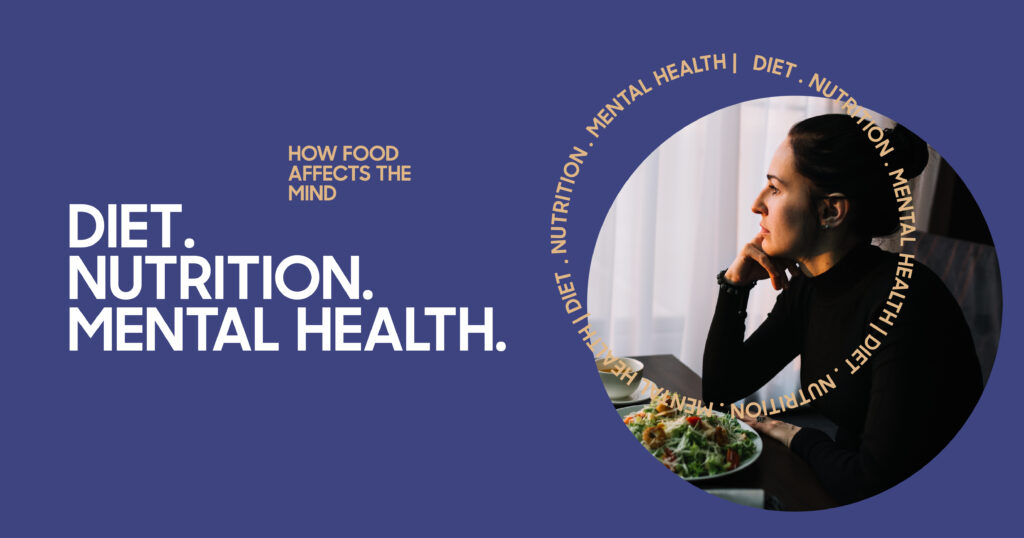Research in the scientific field links nutrition with mental health. Food affects the brain, how it produces neurotransmitters, and your emotional coping systems. Changing your diet will change your mood and may cause depression and anxiety that comes with it. Cognitive function will also be undermined, but nutrient-dense food will help the brain work on a healthy platform, emotionally and mentally.
Nutritional psychiatry has expanded significantly, with the implication that diet changes can be a central pillar in the prevention and treatment of mental health disorders. In this blog, we explore the concerns about nutrition and mental health, how food for the brain affects cognition, the most beneficial mental foods that sustain mood stability, and brain-healthy diets that will make physical fitness easier.
The Science Behind Nutrition and Mental Health
The Brain’s Dependence on Essential Nutrients
The brain requires only 2% of the body’s weight, with the highest percentage being about 20 percent. Therefore, a deficit in some crucial vitamins can affect our mental health and bring about mental fatigue.
Key nutrients are essential for brain health and emotional balance and should include:
- Omega-3 Fatty Acids. Enhances your neuronal communication as inflammation decreases memory and focus.
- B Vitamins (B6, B9, B12). These are Powerful natural aids that produce the neurotransmitters serotonin and dopamine, which assist with mood and the stress response.
- Magnesium. A stress reliever and relaxation promoter, so it lowers anxiety.
- Probiotics. This one helps regulate the gut microbiome overall, which is one of those (through the gut-brain axis) emotional factors influenced.
A diet lacking these nutrients can increase susceptibility to anxiety, depression, and cognitive reduction.
The Gut-Brain Connection: How Digestive Health Affects Mood
The gut-brain axis is a functional link between the gut and the central nervous system. This bond is heavily moderated by the gut microbiome, where trillions of bacteria influence digestion, immunity, and mental health.
A large percentage of serotonin, also commonly referred to as your “feel-good” neurotransmitter, is made in the gut, and this requires a healthy gut microbiome. Yet, an unhealthy diet made of processed foods and too much sugar and fat can definitely tip the scales, promoting inflammation and mood problems.
Several probiotics help to bring balance to the gut, supporting nutrition and mental health (probiotics found in yogurt, kefir or sauerkraut, or miso)
The Best Foods for Mental Well-Being
A diet that is high in nutrients has an immense effect on mood stability, cognition, and stress management. Here are a few more key foods good for the brain and clarity of mind, which ensure emotional clarity:
Omega-3 Fatty Acids. Essential for Brain Function
Omega-3 fatty acids, EPA, and DHA are extremely important for the structure and function of brain cells. Omega-3 fatty acids improve cognitive ability, reduce inflammation, and possibly even aid in depression and anxiety attacks.
Best Sources:
- Sardines, mackerel (fatty fish)
- Flaxseeds and chia seeds
- Nuts and seeds
Antioxidant-Rich Fruits & Vegetables. Protecting Brain Cells
Antioxidants destroy free radicals that can damage brain cells. Some evidence suggests that diets high in antioxidants are also associated with cognitive slowing and mental fragilization.
Best Sources:
- Blueberries (associated with heightened memory and cognitive abilities)
- Dark leafy greens (spinach, kale)
- Dark chocolate (contains flavonoids that promote blood flow to the brain)
Whole Grains: Fueling the Brain with Complex Carbs
Carbohydrates are necessary to create energy in the brain. Unlike refined sugars, complex carbohydrates make for a gradual, low-intensity blood sugar climb within the body.
Best Sources:
- Quinoa
- Brown rice
- Oats
Probiotics & Fermented Foods. Balancing Mood Through Gut Health
A diverse gut microbiome aids mood regulation and emotional resiliency. Probiotics also help to restore this equilibrium by promoting more good bacteria in the colon.
Best Sources:
- Yogurt with live cultures
- Sauerkraut
- Miso
Lean Proteins & Amino Acids: Supporting Neurotransmitter Production
Proteins contain amino acids needed for synthesizing neurotransmitters such as dopamine and serotonin. Without protein, one experiences energy loss, brain fog, and crankiness.
Best Sources:
- Chicken and turkey (rich in tryptophan for serotonin production).
- Eggs contain choline, which is essential for brain function.
- Legumes and lentils are high in plant protein and fiber.
The Negative Impact of Poor Nutrition on Mental Health
Although some foods benefit mental sharpness and emotional balance, sometimes others are more of the opposite.
Sugar. The Hidden Trigger for Mood Swings
Studies indicate that when we consume too much sugar, there are spikes and crashes of blood sugar, causing irritability, fatigue, and heightened anxiety (natural source)
Processed & Fast Foods. Increasing Risk of Depression
A diet rich in highly processed foods devoid of essential nutrients and full of inflammation-inducing, oxidative-stress fatty acids is what prevails in a modern Western diet.
Caffeine & Artificial Sweeteners. Aggravating Anxiety
Caffeine may have an initial energy boost, but too much can cause things like insomnia and elevated stress hormones. Similarly, artificial sweeteners such as aspartame can prevent the production of neurotransmitters and ultimately worsen mood disorders.
How to Build a Healthy Diet for Brain Health
Dramatically improving cognitive function and emotional stability with a high nutrient-density diet. Here’s how:
Prioritize Whole Foods Over Processed Foods
Pick whole, fresh foods that are nutrient-dense and filled with vitamins, minerals, and fiber.
Balance Macronutrients
Ensure your meal is high in proteins, good fats, and complex carbohydrates for a healthy brain.
Stay Hydrated
There is some connection among conditions, including calcium, poor concentration, fatigue, and mood swings, which are dehydration. Work on drinking at least 8 bottles of water a day.
Consider Supplementing Key Nutrients
Some other supplements that may be appropriate for certain individuals are:
- Vitamin D. Used for mood stabilization.
- Magnesium. Relaxes the body, which will help contribute to better sleep.
- Vitamins of the B Complex. Necessary for the work of neurotransmitters
Power of Food in Mental Well-Being
The dietary nutrition and mental health of one are very much intertwined. A conscious choice towards brain-boosting foods, mood stabilizers, and things that contribute towards keeping a person’s mental health high.
Change your diet only a little to stabilize your mind and emotions for the long run. Begin treating your food strategically and see the change in your brainpower and mood right away!
FAQs
How does nutrition affect mental health?
The impact of nutrition on mood is an important factor not only in the general functioning of the human brain but also in the production of multiple neurotransmitters and dyspepsia, which heavily affect mood and cognitive performance.
Can changing my diet help with anxiety and depression?
Yes, Omega-3s, B Vitamins, and Probiotics are nutrients in the dietary form that have been shown to relieve symptoms of depression and support the management of anxiety via dietary intervention.
What foods are best for improving mood?
The ingestion of fatty fish, green leafy vegetables, berries, nuts, and fermented foods stabilizes mood and cognition.
How long does it take for dietary changes to affect mental health?
Some people get the bounce in their step within two weeks, more youthfulness and healthier. They may be the health-optimists whose fitness-induced benefits take a little while to trickle in over the following months.
Are there specific diets recommended for mental health?
The best diet in town is Mediterranean for boosting mental well-being and cognition capacity.







